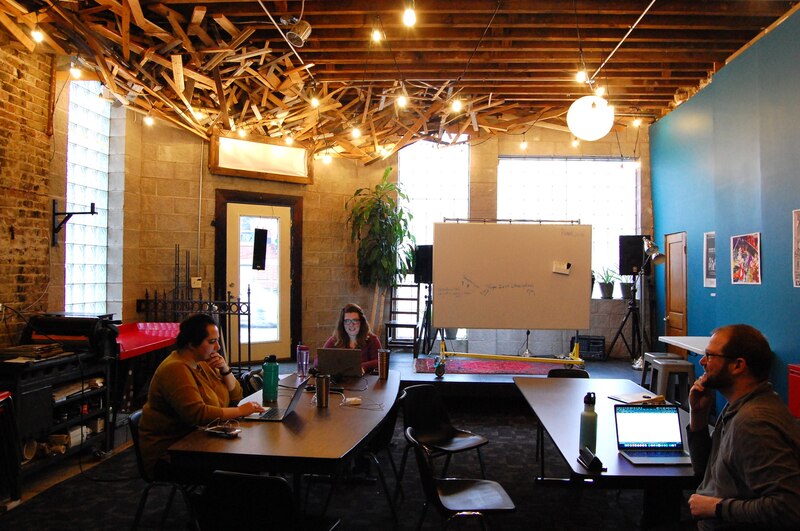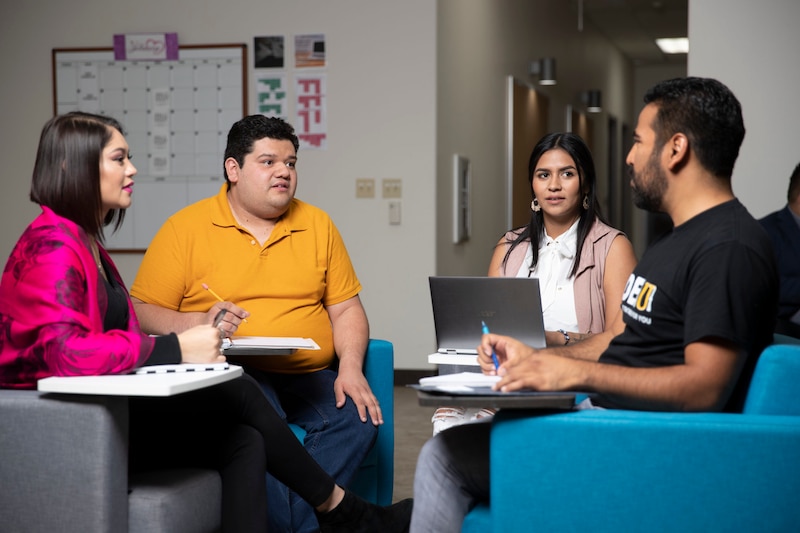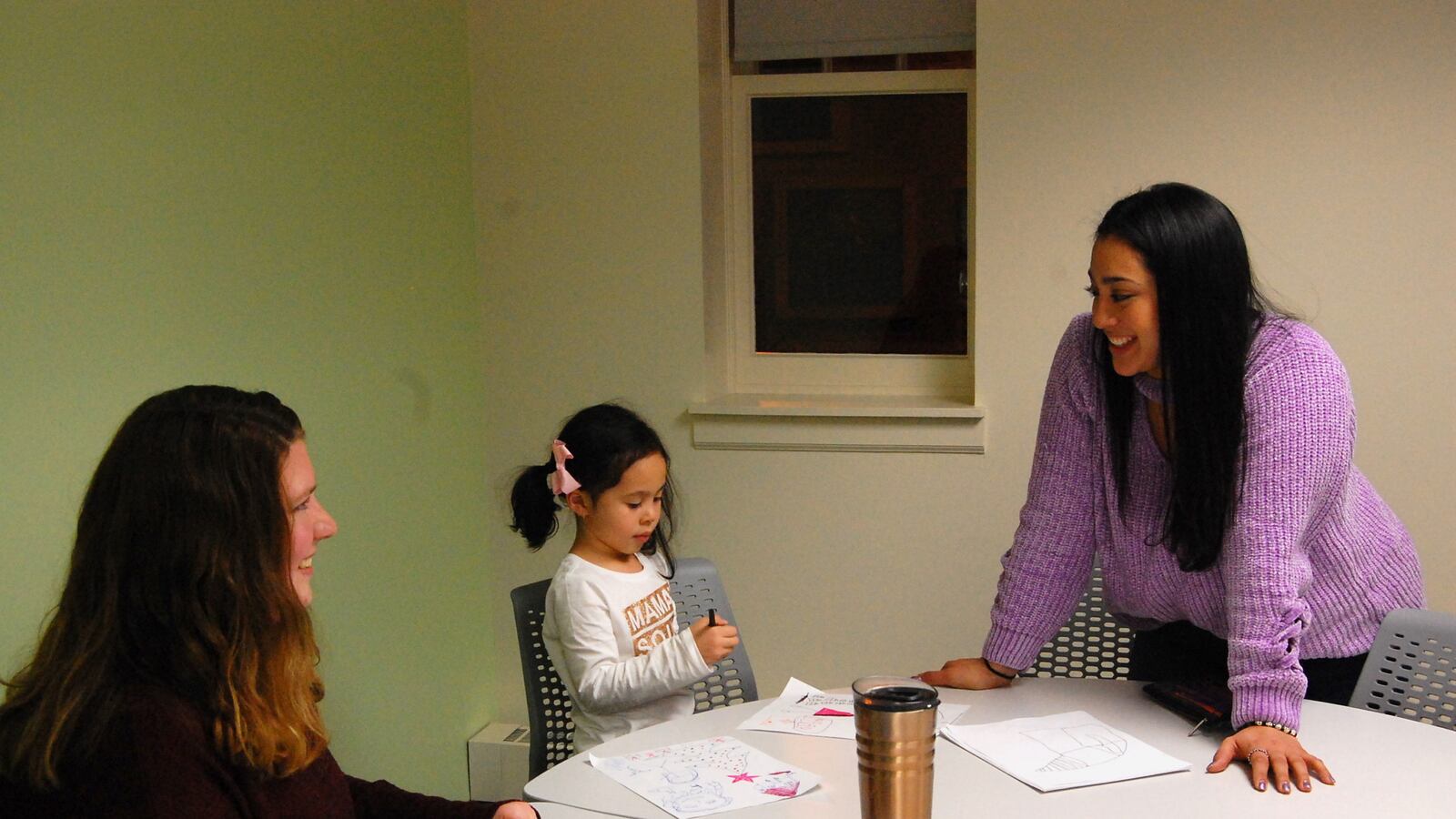Since he was a young child, Nick Chapa’s teachers told him over and over: you’re going to college.
That focus on higher education drew his family to IDEA’s flagship charter school in Texas’s Rio Grande Valley, where students receive years of coaching in preparation for the college admissions process. But when Chapa actually got to college in 2009, his plans unraveled.
Struggling with deadlines and the anxiety he felt during exams, Chapa dropped out after his first year. After Chapa and his wife had a son, Chapa re-enrolled, hoping a change in major would help. But he left again after a semester, continuing his part-time job at Toys ‘R’ Us.
Then Chapa got a call from an administrator affiliated with the IDEA charter network. She told him about a new college program called IDEA-U that would allow him to take his coursework online with the support of a coach. Chapa signed up.
“I figured I didn’t have anything to lose,” said Chapa, now 28. “I guess I was desperate at that point.”
Chapa is now part of a growing effort by charter school operators to help their graduates earn college diplomas in a nontraditional way — by overseeing some of the college experience themselves.
By partnering with Southern New Hampshire University, which enrolls tens of thousands of students from across the country in its low-cost online college programs, the charter operators are coaching students through college. The university provides the coursework and confers degrees, while an arm or affiliate of the charter networks recruits and mentors students.
The Noble charter network in Chicago launched its partnership last year, following the IDEA network in Texas and Match Charter School in Boston. Together, the three programs now enroll nearly 1,000 students, and other charter operators say they’re watching closely.
It’s a notable extension of those networks’ mission, which for years has been to send their mostly low-income students of color to college. More recently, though, it’s become harder to ignore the reality that many of their alumni are leaving higher education without degrees.
“It’s clear for students who stay in college and complete how that support looks through our alumni counseling, but it just didn’t feel like we were doing enough for the students who were ‘stopping out’ of college,” said Eric Rapp, who oversees Noble’s program. “We saw this as an opportunity to provide something different and new and innovative to help re-engage those alumni.”
If successful, these programs will provide students another chance to earn a degree that could bolster their financial futures, while also boosting the charter networks’ college completion rates.
“Just like the charter school movement has been able to successfully set a new bar for student achievement” for K-12 students, said Phillip Garza, the chief college and diversity officer for IDEA Public Schools, “we believe that IDEA-U could set a new bar of access, persistence and completion rates for low-income, first-generation, minority students” in college.
So far, though, students in the programs have earned only a few dozen bachelor’s degrees. And the expansion of these programs worries some observers, who question whether students are getting a high-quality college experience — and whether the degrees students do earn will pay off in the job market.
How it works
IDEA launched IDEA-U in 2017 with around 40 students, including Chapa. Now, the program has around 400 students from across Texas enrolled, about half of whom are IDEA graduates.
Around 95 students are enrolled in Noble’s program, known as Noble Forward, which launched last year. Nearly all are graduates of a Noble school in Chicago.
Match’s program, initially called Match Beyond, began in 2013 by enrolling mostly Match alumni, but was spun off as a nonprofit called Duet in 2018. It now serves around 500 students who graduated from high schools across the Boston area.
The programs differ slightly, but the academics work the same way. Students enroll in one of a handful of “competency-based” degree programs offered by Southern New Hampshire University and progress by completing projects designed to show they’ve mastered key skills.
There are no lectures, professors, or class discussions, but students are assigned readings and videos. Students work at their own pace — instead of on a set academic calendar — re-submitting projects as many times as they need, though the university says students average around two tries. Their projects are evaluated by a university “reviewer” with at least a master’s degree.
“It very much feels like a workplace scenario where your boss is probably not going to give you a lecture before sending you out on a project,” said Amy Stevens, who oversees these programs for Southern New Hampshire University.
The charter networks then offer students an additional layer of academic and personal support. IDEA-U requires its students to come to its facility — open late and on Saturdays — for 12 hours each week, in addition to an hour-long meeting with their coach. In Chicago, Noble Forward coaches hold their one-on-one meetings at a public library or in a rented space that resembles a cozy bookstore.

One Wednesday night in December, 25-year-old Afrodita Salgado met with her coach at a library in Chicago’s Bronzeville neighborhood. Salgado’s 5-year-old daughter, Amelia, came too, wearing a T-shirt that said “Mama’s squad” and doodling as the adults reviewed her mother’s progress.
Salgado graduated from a Noble high school in 2013, and recently earned her associate degree in science from a Chicago community college. She hoped her next step would be the University of Illinois at Chicago, a four-year public university.
But she works full-time as a school clerk in addition to caring for her mother and daughter. At community college, most of her classes were held at night — still, she sometimes had to bring her daughter along — while most of the classes she wanted to take at UIC were in the morning. That schedule, plus the knowledge that her Pell Grant wouldn’t have covered the tuition, made her open to other options.
She enrolled in Noble Forward in October after learning about it from a family member and fellow Noble graduate.
“With this I can actually turn in quality work, instead of whatever I have at the moment,” Salgado said. “I do like having the interaction with teachers, but I feel like for me, right now, this is what’s going to work.”
The flexibility of online courses can keep students from falling through the cracks of a higher education system not designed for them, the charter programs say, whether they’ve struggled academically like Chapa or found the logistics of attending class daunting, like Salgado.
The additional support from coaches also makes a big difference, several students said. Southern New Hampshire University gives its partners access to data about when students are logging in and how many times it takes them to master a project, so coaches can see when students are struggling.
Angela Crawford Neven, who coaches Salgado and others in Noble’s program, said she sends lots of reminder texts and makes lots of check-in calls, assuring students they can restart their coursework even if they fall behind — a message they likely didn’t receive during their previous attempts at college.
“There are things that are going to come up: transportation or family issues or access to technology,” Crawford Neven said. “My main goal is to build a solid, strong foundation in a relationship so that they can feel comfortable coming to me with any of those issues.”
The cost factor
Southern New Hampshire’s partnership programs have another critical advantage: they are affordable.
IDEA-U costs $5,500 a year. Noble Forward costs students $6,000 a year, while Duet costs $7,000. That’s low enough that federal Pell Grants for low-income students cover most or all of the tuition. Southern New Hampshire University also offers scholarships to undocumented students, who don’t qualify for federal financial aid.
Students pay tuition to Southern New Hampshire University, which sends back a portion of that money to the programs to pay for the coaching and other wraparound support. Duet gets 57%, while IDEA-U and Noble officials both say they get around 40%.
The low cost can be especially appealing for students who have already accumulated student debt or previously defaulted on a student loan. Students who return to school are often under intense financial pressure, typically working and caring for children or other family members. Nearly all Noble Forward students work full-time, for example, and about a quarter are parents.
Students sometimes still struggle to pay. For this reason, Noble awards scholarships to cover transportation costs and emergencies, like a missed internet bill, while IDEA offers one-time, no-interest loans funded by donations from IDEA employees.
But the low cost also reflects what the students are getting: a pared-down academic experience that doesn’t involve many of the hallmarks of college.
Johann Neem, a history professor at Western Washington University who recently wrote a book about the purpose of college, worries that programs like these focus too much on helping students get a degree at the expense of experiences like building relationships with professors, exchanging ideas with other students in class, and completing hands-on research in labs.
“This is college reduced of so much of what makes college valuable for people’s hearts and minds,” he said of Southern New Hampshire’s online competency-based programs. “If that’s all people are getting from this, a degree … without the kind of rich intellectual experiences that traditionally have given that piece of paper value, we’ve done something wrong. We’ve cheated people.”
Instead, he said, universities should invest in making a liberal arts education more accessible to low-income students who want that, but need a more flexible schedule. States and the federal government could also spend more to help that happen.
Paul LeBlanc, the president of Southern New Hampshire University, has defended the program against this criticism before, saying it incorporates aspects of a liberal arts curriculum. The partners also try to make up for some of the missing socialization. IDEA-U, for example, holds monthly events for students. And others who’ve worked with Southern New Hampshire University, like Mike Larsson, who co-founded Duet and is now its CEO, argue that the curriculum is high-quality and rigorous.
“This isn’t some alternative program,” said Larsson, pointing out that students do interact with the person who reviews their work. “The curriculum is intentionally designed. There’s no mailing it in.”

But because these partnership programs offer a limited number of degrees, there’s also some risk that students are taking courses that don’t match their career ambitions. Two students who want to be teachers, for example, told Chalkbeat they were working toward degrees in management and communications, respectively.
Larsson says more general degrees allow students to explore multiple career paths. And IDEA-U allows students to enroll in online programs that operate on Southern New Hampshire University’s traditional academic calendar — which lead to degrees in more subject areas — if they want.
Others, like Heather Lattimer, the dean of San Jose State University’s college of education, worry that if students decide they want to transfer elsewhere, it’s difficult to get credit for the work they’ve done. Noble, for example, advises students against transfers and tells them they should be prepared to finish their degrees with Noble Forward.
Lattimer, who studied a partnership between Southern New Hampshire University and Da Vinci Schools, a charter network in California that allows students to stay on for an extra year to take college classes and complete internships, sees promise in these partnerships for students who are older, need a flexible schedule, or can’t get to a college in person, especially when the programs offer extra coaching support. But she’s not sure they are a good idea for traditional college-age students.
“Not to say that our public universities and community colleges are perfect, we aren’t,” Lattimer said. “But they are the option that is both going to provide more comprehensive choices and pathways for students and is going to be recognized more broadly by future employers.”
The charter programs walk a fine line here, promoting the programs as a plan B, not a first choice, for their students. IDEA students can’t apply to IDEA-U until after they’ve graduated high school.
“We want to give them a crack at the traditional system,” Garza said. “We do believe in sending our students to the country’s best colleges, because [they] are set up to receive and support low-income, first-generation, minority students given their endowments, given their resources.”
The problem is, that support doesn’t always materialize, and sometimes isn’t enough. And that leaves students searching for other options.
Who benefits?
All of these partnerships are part of a program called College for America that Southern New Hampshire University launched in 2013. It’s since expanded to include a dozen “community partners” that enroll around 1,400 students.
But the university, known for its national marketing effort, has ambitious expansion goals. Working with charter school operators, which have close relationships with their students and expertise advising their alumni in college, offers access to a ready pool of students.
Rapp, of Noble Forward, said he knew at least two students who enrolled in the program after previously considering online college.
“But they were hesitant about the programs because they didn’t know anything about them, and there was a sense that the online programs weren’t legitimate,” he said. “Once we approached them with this option, the students trusted [it].”
Some charter operators who are looking to improve how they help students who’ve dropped out of college, like Uplift Education in Texas, say they’re watching these partnerships and are considering starting their own. Other networks are already experimenting with online college partnerships.
The New York City and New Orleans branches of the KIPP charter network, for example, have worked with Southern New Hampshire University over the last few years to allow high school students or alumni to take online college classes, while Collegiate Academies, a charter school network in Louisiana, has a partnership for its high school students.
“In general, there should be more models like this,” said Elena Sanina, who leads college access and alumni success work at the Charter School Growth Fund, a nonprofit venture fund that has funded both Noble and Collegiate’s programs. “It might be something we see popping up across the country.”
Noble’s program is too new to have graduated any students. So far, 87 students have earned associate degrees through IDEA-U, while eight have earned bachelor’s degrees.
Data from Duet, which is the oldest of Southern New Hampshire University’s community partner programs, provide more insight.
Of the 793 students who’ve enrolled in an associate degree program through Duet since 2013, about a quarter graduated, a quarter withdrew, and half are still enrolled. Among the 163 students who enrolled in a bachelor’s degree program, 13% got their degree, 20% withdrew, and the rest are still enrolled.
Overall, Southern New Hampshire University officials say, about half of the students who start an online bachelor’s degree at the university, which includes full- and part-time students, get one within six years.
Expansion plans
Noble Forward hopes to enroll around 1,000 students within eight years. IDEA-U has plans to serve thousands of students across 30 locations over the next decade. Both say they plan to enroll more students who aren’t alumni as they grow. Duet, too, wants to expand to 2,000 students over the next four to five years.
The programs could change as they grow. Right now, IDEA-U shares a brand name and some resources with the K-12 charter network, but it’s technically a separate company that contracts with Southern New Hampshire University and employs IDEA-U’s staff — an arrangement Garza says prevents the mixing of taxpayer dollars meant to go to K-12 public schools with money for higher education.
That setup also means IDEA-U is allowed to take in a profit. (In 2019, Garza said, IDEA-U ended the year with a surplus of around $11,000.) IDEA officials are deciding whether it should become a standalone company, its own nonprofit like Duet, or maintain its connection to the network.
For now, the Noble charter network is running Noble Forward as a program of its own. Officials there say they take care to fundraise and budget separately to avoid mixing those funds with public dollars meant for Noble’s middle and high schools.
There are other open questions. Some students wonder how employers will view their online degrees. One experiment found that employers were less likely to call back applicants who held a business bachelor’s degree from an online for-profit college than if they attended a less selective public university or college. (Southern New Hampshire University is a nonprofit.)
Larsson, of Duet, says graduates of his program have landed jobs or gained admission to graduate school.
“Four or five years ago, we wondered if students were going to take a discount in the job market, but we have not seen that at all,” he said. “That college degree is often just the toll that people have to pay to get considered.”
Since Chapa enrolled in IDEA-U in October 2017, he has earned his associate degree. He estimates he’s about two months away from finishing his bachelor’s degree in management with a concentration in public administration, which he often works on while his 7-year-old son is at school. He’s hoping to apply for government jobs when he’s done.
“I feel like it’s a lot better than having no degree,” he said. “I’d much rather have an online degree, even if it’s a little inferior, which I don’t think it is. But even if it is, I’d rather have that than nothing.”
To learn more about the challenges low-income students of color face in college, and what colleges are doing to help them, read Chalkbeat’s Ready or Not series by reporters in our Newark and Detroit bureaus.


